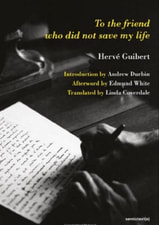A WRITER'S WIT |

It’s difficult to know what I think of this book, thirty years after it is first published. On the one hand, it is a fair representation of what the times are like in 1991 Paris. When the author dies at thirty-six from AIDS, I am forty-three—very much a part of the same demographic. I’ve taken an HTLV test which claims I am negative. Whew.
Yet there is no real relief for anyone: neither the men and women who test positive and will soon die nor for their friends who have partaken of the same risky behaviors and remain free. Guibert portrays for gay Frenchmen, as do many American gay writers at the time, the devastation that overtakes our community from coast to coast. On the other hand, after thirty years, most of the scientific information Guibert possesses is redundant or has been proven wrong. It’s painful to read about either party.
Even if this work functions as a sort of roman à clef by not naming names, it certainly portrays the dastardly acts of treacherous friends. A character named Muzil is supposedly the noted philosopher Michel Foucault; Marine is based on the life of actor, Isabelle Adjani; and yet “Bill,” Guibert’s friend of the title remains a mystery, a traitor who brags about, as a Miami pharmaceutical executive, getting Guibert in on the ground floor of a vaccine, but cruelly fails to do so. This book, a combination of linear and nonlinear elements, takes us back to the past, but it strangely plops us into the present of yet another untamable virus and directs us toward a future of even more death and destruction. Not a gay book in the original literary sense, but so gay in a tragic way.
NEXT FRIDAY: My Book World | Thor Heyerdahl's Kon-Tiki



 RSS Feed
RSS Feed